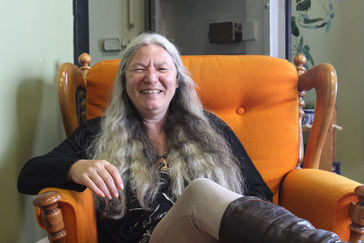Only her simple request to hold a red pouch filled with loose tobacco belies her nervousness at being asked to open up and share her views. Tobacco is a native sacred medicine, used in ceremonies and as currency to honour Elders or to pay for ceremony. It shows respect both for natives and for their culture. Merely holding the pouch is comforting to her, Grant explains. Grant first came to New Leaf in 1999 on a job placement as a student of the Community Services program at the Nova Scotia Community College, Pictou Campus. “I was really stressed when I was told I needed to come here,” Grant confides. “I was a mature student and my instructor felt that I needed a placement that was challenging to me. Initially I had gone into that program looking to work at Tearmann Society. I wanted to work with abused women so this placement was a particular challenge for me in terms of my own personal goals. And I was intimidated; I was afraid because I think, like many people even today, I had these pre-conceived notions of the men that I would be working with. Very quickly I realized that these men are human beings and not the monsters I had imagined. Generally speaking, they tend to be really good men — very hard working and trying to provide for their family and trying to do everything they were taught was right. But when it came to relationships, they struggled. I have been here ever since.” Grant has also been doing some work out of the Tatamagouche Centre with the Peace and Friendship Project, specifically around social justice and building respectful relationships between native and non-native peoples. She strongly believes that this work is all connected because it is all about relationships and how they can go terribly wrong quite easily but it’s work to keep them going well and/or to repair harm done. The New Leaf program runs on the premise that domestic violence is a social issue, Grant says. “So it’s how the genders are socialized. From the very first time a male toddler falls down and hurts himself, the first thing adults say is ‘big boys don’t cry’ and they get that reinforced by all the adults that are around them. That’s why we work in a group setting. It takes the adults around us to help to teach us how to do things differently and hopefully in a better way.” Grant’s accumulated knowledge comes not from intensive studying in hallowed halls of higher learning establishments; rather, it is generated from a more organic place than that. “I have sisters,” she smiles. “I have mothers and grandmothers and aunties and friends, daughters and granddaughters.” She adds, “I also had some very good teachers in Bob (Whitman) and Ron (Kelly) who ran this program almost its entire lifespan, and from the men themselves. And I think part of it is my own world view. I sort of see this society as set up as a triangle. There’s the people in power at the top and everybody on the bottom end is encouraged to fight their way to the top. We see it in a number of the men who are workaholics. It’s a normal thing for couples to want to make their lives financially sound. What we often see happen is that, this desire to make that success happen means that lives become totally out of balance. Working 18 or 20 hours a day year after year, you can’t actively participate in your relationship, and the cost to the relationship can be high. That was never their intention. They believe that is what they’re supposed to do as men and, there are certain perks to it. You get valued as a successful male in society. Unfortunately, they often are left feeling confused, angry, and in crisis, because losing their family was not what was supposed to happen. “I come in with a world view of the circle. The circle is part of the original instructions of this territory. The circle is where no one is any more or less important than anyone else. Every single person in the circle brings with them knowledge, experiences, and value, and the circle is stronger because of every individual in it. We’re all in this together. So let’s sit down and really talk about things. Together we have everything we need to figure this out. We, New Leaf staff, sit in circle with the men we work with, because we are also learning from them.” “A lot of what we do with the men is defining what it is to be a man, a father … People have these vague notions of what these things really mean; which are reinforced by commercialism that promotes exaggerated stereotypes. These notions are unattainable because they’re not tangible or defined. When our clients realize they have the authority to decide that for themselves, it becomes something real and attainable. And they don’t just decide it for themselves anymore. They learn to include their families and their partners and actually participate in that relationship on a whole new level. They learn that it was not all on them. So, instead of being all by yourself at the peak of the triangle, you’re creating the circle and participating equally.” New Leaf has been in existence for 30 years; Grant took over as executive director when Ron Kelly retired about a year ago, but has been involved with New Leaf for about 18 years in various capacities. One of her first projects with New Leaf was in developing a parenting program, specifically for New Leaf clients. “We haven’t been able to offer it since 2003 because of a lack of funding for it. It’s a shame since it was so well received by our clients who felt safe asking questions about parenting when they were surrounded by other fathers looking for the same information.” Sterling Smith, Grant’s colleague, has also been with New Leaf on a volunteer basis for about eight years but became a staff member about a year ago. He cherishes the relationship he and Grant share. “She is dedicated and excited to be a part of the New Leaf program,” he lauds. “Cathy is all heart and is addicted to helping people. She brings a woman’s perspective to the program and the men need that, they respect that.” Most of the men who come to New Leaf come in crisis, Grant says. “So our main focus when they first come in is getting them through that.” The number of men coming to the program on their own is rising to be a fairly significant percentage. Grant says, “We have fathers bringing in their sons, we have men bringing in their brothers and their friends and their co-workers.” Men involved in the program are recognizing its value and the good it does them and their families. “Men are socialized to not talk to each other about certain things. That’s why we view it as a social issue because nothing can change until men learn how to talk with other men about relationships in a good way. It needs to be done in a non-judgmental way, while still holding them accountable for the choices they made. That gives them the power to make different choices. It is always a dance of sorts.” The premise behind New Leaf is simple, Grant says: “We give men the permission, support and skills to be the men they want to be as opposed to the men they thought they were condemned to be. We are all in this big mess together. Simply talking can change everything. That’s the power of the circle.” This article was originally published by The Pictou Advocate and was written by Jackie Jardine. The link to the original article can be found here.
0 Comments
Taking Responsibility only begins with saying “I’m sorry.” Being truly sorry is an action. It means following through and making sure you do what you need to do to make sure it never happens again. In my work here over the years, I received the most amazing apology I ever heard. It contained what the client was sorry for, why he was sorry for it, declared that it was against all his values and a promise to never do it again. I was deeply moved because the apology was well thought out, eloquent, and he delivered it very sincerely. The very next week, he not only did the same thing again that was hurtful, it was nastier than the first time. People may believe what they hear for a short time, but ultimately, we have a tendency to believe what we see. If what we see is you being the sorriest person in the County but continuing to do it again anyway, you have lost all credibility. When you try to blame someone else for your choices, you are not taking responsibility. It is impossible to do both at the same time. So, why should anyone bother to take responsibility for anything in this world of only admitting to what you got caught for? Simply put- It Frees you. You don’t have to carry around guilt, shame, or the feeling that you are not a good person. All those negative emotions accumulate and over time, make it impossible for you to ever feel good about yourself. You go around blaming others and the world for everything, argue with people frequently which leaves you feeling just plain miserable. Or worse, feeling like a victim all the time, even though you are the one creating it. It’s crazy making. Talk about it, fairly. Take responsibility for your choices. It may not be comfortable at the time, or even right away, but it will begin to free you. And you will notice all your relationships getting better, because you are better. You are getting into the routine of being the person you choose to be. It doesn’t get much better than that really. Reduce Abuse. Support, Mentor, Change.
|
AuthorsNew Leaf and community contributors Archives
October 2017
Categories
All
|


